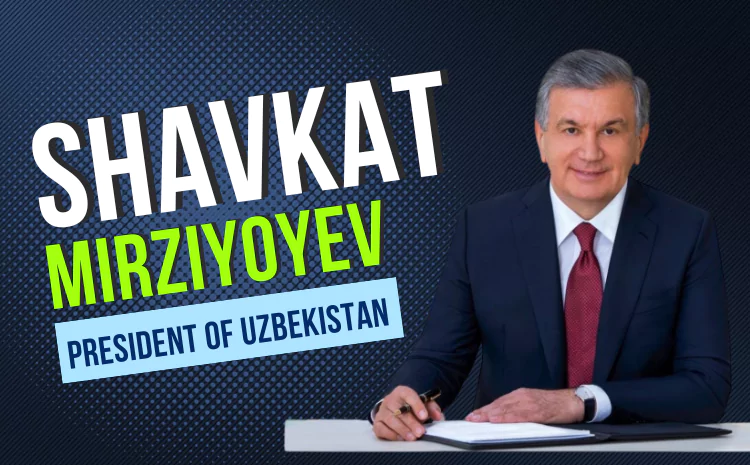Nestled in the heart of Central Asia, Uzbekistan is a nation rich in history, culture, and natural resources. Yet, for decades, the country was shrouded in isolation and authoritarian rule under the iron fist of Islam Karimov. In 2016, a new era dawned upon Uzbekistan with the election of Shavkat Mirziyoyev as the President of Uzbekistan. Mirziyoyev, a seasoned politician and former Prime Minister, emerged as a beacon of hope, promising to usher in a period of reform and transformation.
A Life Dedicated to Public Service
Born in 1957 in the Surkhandarya region of Uzbekistan, Mirziyoyev’s life has been marked by a deep commitment to public service. His early career was spent as a teacher, before he entered the world of politics, joining the Communist Party of Uzbekistan in the late 1980s. His rise through the ranks was steady, as he held various positions in local and regional governments, gaining a reputation for his pragmatism and administrative skills.
In 2003, Mirziyoyev was appointed Prime Minister of Uzbekistan, a position he held for 13 years. During his tenure, he oversaw significant economic growth and played a pivotal role in implementing strategic reforms, including the modernization of agriculture and the development of infrastructure. His experience and leadership qualities paved the way for his ascension to the presidency in 2016.
Ushering in an Era of Reform
Mirziyoyev’s election marked a turning point in Uzbekistan’s history. He inherited a nation grappling with economic stagnation, widespread corruption, and a legacy of human rights abuses. Undeterred by the challenges, Mirziyoyev embarked on an ambitious reform agenda, determined to modernize the country and improve the lives of its citizens.
Economic reforms were at the forefront of Mirziyoyev’s agenda. He pursued a policy of liberalization, reducing state control over the economy and encouraging private enterprise. He also sought to attract foreign investment, recognizing the crucial role of international collaboration in Uzbekistan’s economic development.
Social reforms were equally important to Mirziyoyev. He prioritized education and healthcare, investing in infrastructure and improving access to quality services. He also championed women’s empowerment, promoting their participation in the workforce and society at large. Religious tolerance was another key focus, as Mirziyoyev sought to foster a harmonious and inclusive society.
Strengthening the Rule of Law
Mirziyoyev undertook comprehensive measures to combat corruption, a pervasive issue that had plagued Uzbekistan for decades. He established anti-corruption agencies, strengthened oversight mechanisms, and introduced stricter penalties for corrupt officials. His efforts resulted in a significant decline in corruption, creating a more transparent and accountable government.
Ensuring judicial independence was another crucial aspect of Mirziyoyev’s legal reforms. He sought to establish an impartial and efficient judicial system, free from political interference. He implemented reforms to improve the selection and training of judges, enhance judicial transparency, and protect the rights of defendants.
Mirziyoyev also recognized the importance of freedom of speech and assembly, fundamental pillars of a democratic society. He eased restrictions on the media, allowing for greater expression of diverse viewpoints. He also facilitated the registration of non-governmental organizations, enabling civil society to play a more active role in the country’s development.
Uzbekistan’s Role in the Region
Under Mirziyoyev’s leadership, Uzbekistan has emerged as a key player in Central Asia, actively engaging with its neighbors and promoting regional cooperation. He has strengthened bilateral ties with neighboring countries, fostering economic partnerships and addressing common challenges such as water security and border management.
Mirziyoyev has also played a leading role in regional initiatives, such as the Central Asia Cooperation Council and the Shanghai Cooperation Organization. He has advocated for regional integration, promoting trade, investment, and infrastructure development across Central Asia.
Challenges and Prospects
Despite the significant progress made under Mirziyoyev’s leadership, Uzbekistan still faces challenges. The legacy of the Karimov era lingers, with its authoritarian tendencies and entrenched interests. Continued economic reform is essential to diversify the economy, create jobs, and reduce poverty. Maintaining political stability is crucial to sustain the momentum of reform and attract foreign investment.
Despite these challenges, Uzbekistan’s prospects under Mirziyoyev’s leadership are promising. His commitment to reform, his pragmatic approach, and his strong regional leadership have instilled a sense of optimism and hope in the country. Uzbekistan is poised to play an increasingly important role in Central Asia and beyond, as it continues its journey towards becoming a prosperous, democratic, and inclusive nation.
Conclusion
Shavkat Mirziyoyev has emerged as a transformative leader, guiding Uzbekistan through a period of unprecedented change. His dedication to reform, his commitment to improving the lives of Uzbeks, and his vision for a brighter future have inspired a nation. Uzbekistan, once shrouded in isolation and authoritarian rule, is now embracing a new era of openness, progress, and prosperity, thanks to the leadership of Shavkat Mirziyoyev.

